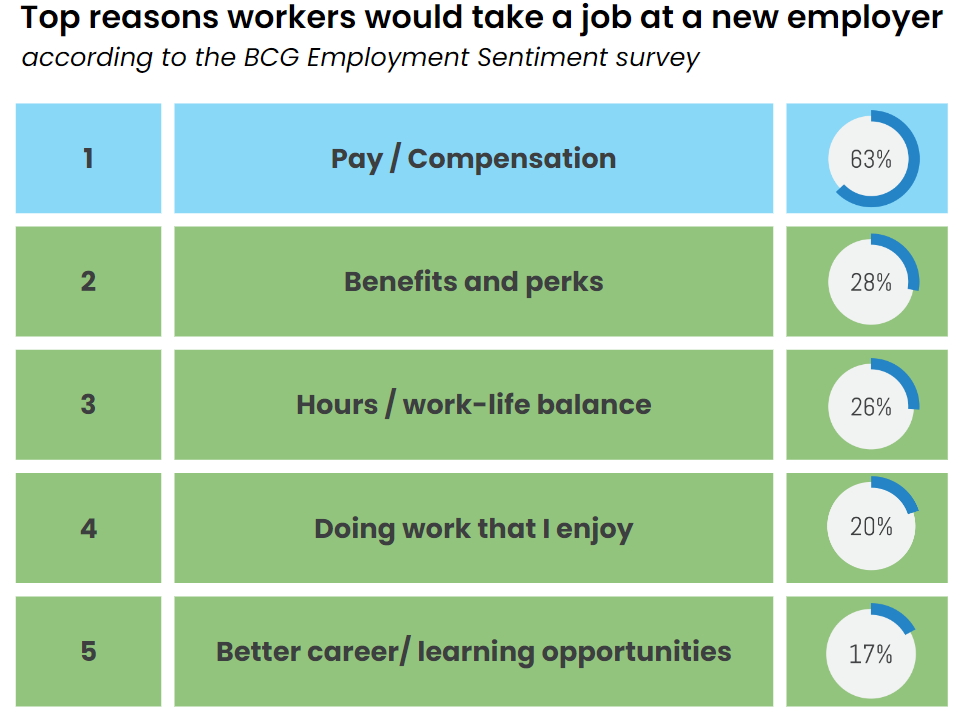Enhance Your Business with Competitive Salaries

Looking to grow your business and expand your team? That’s fantastic! However, attracting and retaining top talent often requires offering strong incentives. As a business owner, you need to figure out a targeted and comprehensive plan to attract and keep talented employees – and part of this plan should include a competitive salary.
What Is A Competitive Salary And Why Does It Matter?
By definition, competitive salaries are equal to or greater than other salaries offered for a similar role and location. So why are they important, and how can you, as a business owner, afford to offer them?
Enhance Your Company Culture
Offering a competitive salary has two main benefits: it enhances your external image and improves your workplace environment.
Paying your employees at a similar industry rate to other competitors elevates your status and demonstrates financial responsibility. Once your company finances are in order, you can price salaries at a competitive rate. It implies that your company is running so efficiently that you can afford to pay the going rate – which in turn attracts talented employees.
Furthermore, recent studies have shown that good pay is essential to retaining employees: one 2022 survey in the UK conducted by Edenred found that a pay rise would encourage 47% of employees to stay in their current job. [1] This demonstrates why it’s so important to not only have a competitive salary but also consider other financial incentives, to complement bonuses and pay rises.
What Happens If You Don’t?
Potential hires are far more likely to choose a company that pays them what they are worth, so it’s important to keep your wage offers in line with the accepted industry standard. A BCG survey from 2023 found that the top reason employees chose a new job was pay, with 63% of respondents selecting this option. [2]
Skilled employees who recognise their worth won’t fall below the median line when it comes to wages. So, if you’re hiring a research assistant for £20,000/year, but the company next door is offering the post for £35,000/year, you’ve got a problem.
Moreover, paying your employees well can enhance internal company culture. Competitive salaries provide incentives for employees to work efficiently and enjoy their role, creating a more positive and productive workplace environment. Once your employees feel valued and enjoy their workspace, you’re far more likely to retain the talented staff you worked so hard to hire.
It's also important to stay on top of your financial situation and ensure your business is running optimally, so you have the extra breathing room to price competitive salaries and pay your employees well. A weekly review tool would automatically monitor your company finances, so you can map trends and price wages accordingly.
By contrast, offering wages below a competitive salary rate can mean your company gets overlooked in the search for jobs, or your employees become dissatisfied and unproductive. This in turn affects the efficiency of the business. An extra employee can take on surplus workload, which allows you, the owner, to work on managing your company instead of working for it.
How to Determine a Competitive Salary
So now we’ve established why offering a competitive salary is so important, how exactly do you price and offer one – especially if you’re feeling the pressure of inflation and you’re low on liquid assets?
Start by considering the basics, such as the legal requirement to pay the national minimum wage.
In the UK, as of 2024, for 16- to 17-year-olds and apprentices, this would be £6.40/hour. For 18- to 20-year-olds, this would be £8.60.
The national living wage for over-21s is £11.44/hour.
(In July 2024, the new government announced plans to eliminate the age restrictions on minimum wage. It is a good idea to remain up to date with the statutory regulations in case they change.)
These are your legal minimum limits – but if you want your employees to go above and beyond, your company should too. This means that you should consider the cost of living, the rate of inflation, and any future salary rises or bonuses for employee progression within the company.
As mentioned previously, you should also identify what other businesses are offering, and have an idea of the average or median salary.
Then, consider using CloudFO, the AI finance colleague, to create company income projections, and weigh up the immediate cost of the proposed competitive salary with the projected benefits of another employee in the business. CloudFO can run the analysis to determine if growing your team is feasible while understanding the associated risks. This way, you can make informed decisions with peace of mind.
Alternatives to a Competitive Salary
But what if inflation has hit your company hard, and you need to cut costs to stay afloat before you can offer competitive salaries? CloudFO has got you covered there as well. Our new weekly review tool allows you to receive regular updates about your company's financial performance, and can highlight ways to optimise your business in order to save money and increase efficiency.
In addition to CloudFO’s services, perhaps consider alternative employee incentives if you can’t yet offer a competitive salary, like flexible hours or working from home. Creating a positive and diverse internal company culture is another great way to keep your employees feeling happy and valued.
After all, staying on top of your company’s finances with CloudFO gives you the freedom to expand later on. It gives you the extra financial boost you need to offer your potential employees competitive salaries, edge ahead of your competition, and supply your business with the resources it needs to grow and prosper.


